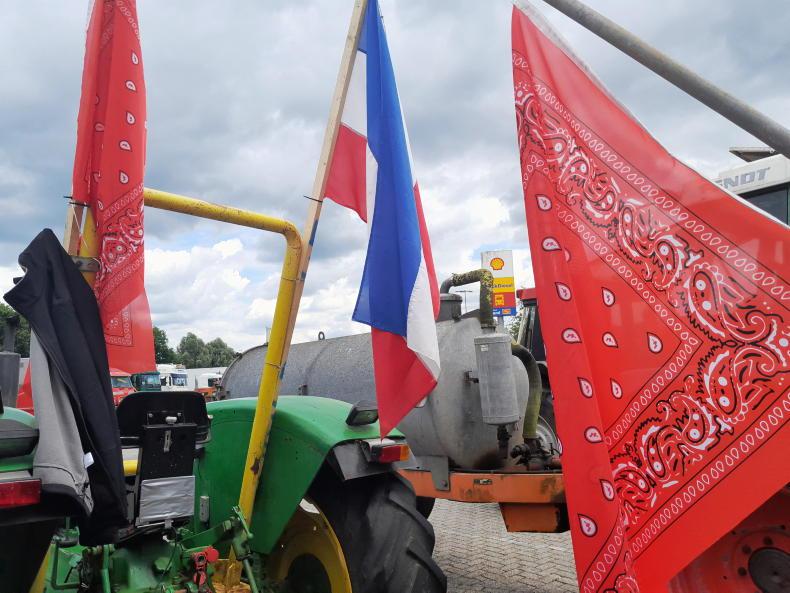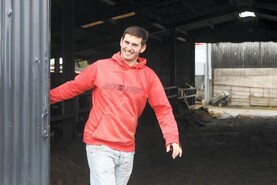Around 3,000 tractors brought traffic to a stop in central Brussels, Belgium, on Friday when farmer groups from Flanders took to the streets to protest what they see as a failure of their government to deliver on farm policy.
The traffic demonstration took place near the centre of the EU's policymaking headquarters.
Flanders has yet to put its CAP strategic plan into action, despite the plan getting the green light from the European Commission before Christmas.
Internal Belgian politics slowed down its approval and concrete detail on the final plan’s schemes is slow to come for farmers on the ground.
Farmer organisations - a number of which banded together for Friday’s protest - have said that certainty is needed immediately around the new CAP to ensure that spring planting can take place without delay.
Nitrates
Another reason farmer groups have cited for taking to the streets relates to ongoing uncertainty regarding the future of the region’s nitrates rules.
Flanders currently has a limited nitrates derogation, but could very easily be forced to follow Wallonia - the southern half of the country - away from any derogation and back down to a maximum stocking rate of 170kg organic N/ha, if not less, with the government pushing to tighten up on nitrates.
Across Flanders’ northern border is the Netherlands, in which 2022 was the last year farmers had a full nitrates derogation.
The European Commission dictated a phase-out of the Dutch derogation over the coming years that will see farmers stepped down from 250kg organic N/ha to 170kg organic N/ha.
Belgium is one of the most heavily stocked countries in the EU and despite being one-sixth the size of Ireland, Flanders has around 1.3m head of cattle, over 5.5m pigs and more than 40m poultry birds.
Anger on the streets
The farmer group Algemeen Boerensyndicaat - roughly translated to the general farmers union - made three demands as its members flocked to the Belgian capital.
It is demanding an immediate enacting of the CAP plan, a “thorough” relook at Flanders’ derogation agreement and “a future” for farmers in the region.
The Flemish young farmers’ group Green Circle stated that it was participating in the protest to deliver “one clear message” to government in Flanders - ‘enough is enough.’
Similarities with the Dutch
The protest comes two weeks after 500 Green Circle members demonstrated with crosses dubbed with the words 'RIP young farmers' outside Flanders’ government offices.
Also tied to the crosses were patches of fabric of the Dutch ‘farmers’ handkerchief’ design, which have become symbolic of anti-government and pro-rural sympathies in Holland and Belgium since farmers intensified protests in the Netherlands last year.

Traditonal farmer-style handkerchief flags hung from tractors in the Netherland sin 2022. Similar flags are being used in Brussels this week. / Noel Bardon
Farmers there protested against government plans to make a portion of farmers sell up in areas where ammonia emissions are high.
Imagery, social media and slogans posts circulated by farmers attending Friday’s protest in Brussels share many similarities with the protests that swept the Netherlands over the summer of last year.
Dutch is the first language spoken in Flanders, a region which shares a very similar culture and range of farming systems with the Netherlands, just across its northern border.
Read more
Watch: Traffic tailback for miles at Dutch farmer protests
Dutch dairy farmers ‘shocked’ at how far nitrogen reduction plans go
Explainer: Why are Dutch farmers protesting?
On the ground: what are the Dutch farmer concerns?
Around 3,000 tractors brought traffic to a stop in central Brussels, Belgium, on Friday when farmer groups from Flanders took to the streets to protest what they see as a failure of their government to deliver on farm policy.
The traffic demonstration took place near the centre of the EU's policymaking headquarters.
Flanders has yet to put its CAP strategic plan into action, despite the plan getting the green light from the European Commission before Christmas.
Internal Belgian politics slowed down its approval and concrete detail on the final plan’s schemes is slow to come for farmers on the ground.
Farmer organisations - a number of which banded together for Friday’s protest - have said that certainty is needed immediately around the new CAP to ensure that spring planting can take place without delay.
Nitrates
Another reason farmer groups have cited for taking to the streets relates to ongoing uncertainty regarding the future of the region’s nitrates rules.
Flanders currently has a limited nitrates derogation, but could very easily be forced to follow Wallonia - the southern half of the country - away from any derogation and back down to a maximum stocking rate of 170kg organic N/ha, if not less, with the government pushing to tighten up on nitrates.
Across Flanders’ northern border is the Netherlands, in which 2022 was the last year farmers had a full nitrates derogation.
The European Commission dictated a phase-out of the Dutch derogation over the coming years that will see farmers stepped down from 250kg organic N/ha to 170kg organic N/ha.
Belgium is one of the most heavily stocked countries in the EU and despite being one-sixth the size of Ireland, Flanders has around 1.3m head of cattle, over 5.5m pigs and more than 40m poultry birds.
Anger on the streets
The farmer group Algemeen Boerensyndicaat - roughly translated to the general farmers union - made three demands as its members flocked to the Belgian capital.
It is demanding an immediate enacting of the CAP plan, a “thorough” relook at Flanders’ derogation agreement and “a future” for farmers in the region.
The Flemish young farmers’ group Green Circle stated that it was participating in the protest to deliver “one clear message” to government in Flanders - ‘enough is enough.’
Similarities with the Dutch
The protest comes two weeks after 500 Green Circle members demonstrated with crosses dubbed with the words 'RIP young farmers' outside Flanders’ government offices.
Also tied to the crosses were patches of fabric of the Dutch ‘farmers’ handkerchief’ design, which have become symbolic of anti-government and pro-rural sympathies in Holland and Belgium since farmers intensified protests in the Netherlands last year.

Traditonal farmer-style handkerchief flags hung from tractors in the Netherland sin 2022. Similar flags are being used in Brussels this week. / Noel Bardon
Farmers there protested against government plans to make a portion of farmers sell up in areas where ammonia emissions are high.
Imagery, social media and slogans posts circulated by farmers attending Friday’s protest in Brussels share many similarities with the protests that swept the Netherlands over the summer of last year.
Dutch is the first language spoken in Flanders, a region which shares a very similar culture and range of farming systems with the Netherlands, just across its northern border.
Read more
Watch: Traffic tailback for miles at Dutch farmer protests
Dutch dairy farmers ‘shocked’ at how far nitrogen reduction plans go
Explainer: Why are Dutch farmers protesting?
On the ground: what are the Dutch farmer concerns?







 This is a subscriber-only article
This is a subscriber-only article










SHARING OPTIONS: